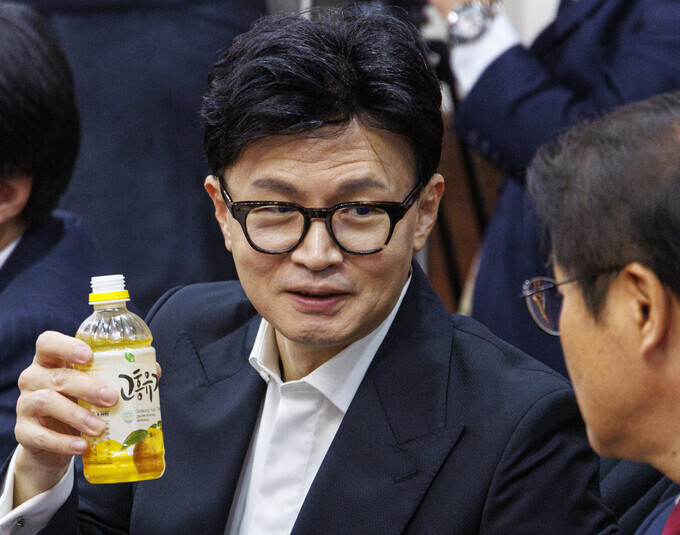hankyoreh
Links to other country sites 다른 나라 사이트 링크
Korean Justice Ministry’s plan to tighten asylum requirements prompts concern of arbitrary denials

The South Korean government has announced plans to amend the Refugee Act by adding more valid reasons for denying asylum applications and deporting asylum seekers.
Since the proposed amendment would include more reasons than those stipulated in the Convention Relating to the Status of Refugees (Refugee Convention), which was adopted by the UN in 1951, there are concerns that the expanded reasons could be exploited to expel refugees. Critics say that would violate the spirit of the Refugee Convention, which strictly prohibits forcible repatriation.
The proposed amendment to the Refugee Act that was unveiled on Tuesday would enable officials to reject the petitions of asylum seekers who have damaged or are likely to damage national security, public order or public welfare and to cancel the status of already approved refugees if such issues occur. The Korean Ministry of Justice said the public comment phase on the amendment will last from Dec. 13 to Jan. 3.
The reasons for not granting refugee status that are currently stipulated in Article 19 of the Refugee Act are the commission of war crimes, crimes against humanity or serious nonpolitical crimes.
While announcing the amendment, the Justice Ministry said it was only updating domestic law with matters that were already stipulated in the Refugee Convention.
“We have had inadequate legal grounds for blocking asylum petitions by actual and suspected terrorists. This amendment will enable public and state safety to become the top priority in the refugee review process, which also happens to be the global standard,” said Justice Minister Han Dong-hoon in a press release.
But critics say the ministry’s proposed amendment interprets provisions in the Refugee Convention in a way that contravenes the convention’s spirit. In connection with expulsion, the convention stipulates that “Contracting States shall not expel a refugee lawfully in their territory,” while making an exception for the “grounds of national security or public order.”
The ministry has loosely interpreted that exception as being grounds for allowing expulsion and then gone further by applying that as a reason for denying refugee status. The legitimate reasons that the convention provides for such denial of status don’t include anything related to national security or public order.
The phrase in the proposed amendment about people who are “likely” to damage the public order or public welfare is also unclear, which some think could open up the door to arbitrary interpretations.
“The amendment defines reasons for rejecting refugee petitions more broadly than the Refugee Convention, which is likely to be taken as the grounds for indiscriminate rejecting petitions and expelling asylum seekers,” said Kim Yeon-ju, an attorney with the NANCEN Refugee Rights Center.
The Korean office of the UNHCR, also known as the UN Refugee Agency, also sees the proposed amendment as problematic and is currently discussing its official opinion.
Some believe the proposed amendment is designed to dispel concerns raised in some quarters about Han’s push to establish a new immigration agency.
Han clarified in a policy meeting with lawmakers of Korea’s ruling People Power Party on Dec. 6 that establishing the new agency “doesn’t mean the unconditional acceptance of large numbers of foreigners; it means the government taking a firmer grip on managing and controlling immigration.”
“This means only bringing in foreigners that we need based on meticulous judgment and predictability and being tougher on undocumented migrants,” the justice minister said, explaining that the Refugee Act amendment was part of the same agenda as the new immigration agency.
By Oh Yeon-seo, staff reporter; Lee Jae-ho, staff reporter
Please direct questions or comments to [english@hani.co.kr]

Editorial・opinion
![[Guest essay] Preventing Korean Peninsula from becoming front line of new cold war [Guest essay] Preventing Korean Peninsula from becoming front line of new cold war](https://flexible.img.hani.co.kr/flexible/normal/500/300/imgdb/original/2024/0507/7217150679227807.jpg) [Guest essay] Preventing Korean Peninsula from becoming front line of new cold war
[Guest essay] Preventing Korean Peninsula from becoming front line of new cold war![[Column] The state is back — but is it in business? [Column] The state is back — but is it in business?](https://flexible.img.hani.co.kr/flexible/normal/500/300/imgdb/original/2024/0506/8217149564092725.jpg) [Column] The state is back — but is it in business?
[Column] The state is back — but is it in business?- [Column] Life on our Trisolaris
- [Editorial] Penalties for airing allegations against Korea’s first lady endanger free press
- [Editorial] Yoon must halt procurement of SM-3 interceptor missiles
- [Guest essay] Maybe Korea’s rapid population decline is an opportunity, not a crisis
- [Column] Can Yoon steer diplomacy with Russia, China back on track?
- [Column] Season 2 of special prosecutor probe may be coming to Korea soon
- [Column] Park Geun-hye déjà vu in Yoon Suk-yeol
- [Editorial] New weight of N. Korea’s nuclear threats makes dialogue all the more urgent
Most viewed articles
- 1Yoon’s broken-compass diplomacy is steering Korea into serving US, Japanese interests
- 2[Guest essay] Preventing Korean Peninsula from becoming front line of new cold war
- 3S. Korean first lady likely to face questioning by prosecutors over Dior handbag scandal
- 4Lee Jung-jae of “Squid Game” named on A100 list of most influential Asian Pacific leaders
- 5After 2 years in office, Yoon’s promises of fairness, common sense ring hollow
- 6Hybe-Ador dispute shines light on pervasive issues behind K-pop’s tidy facade
- 7Japan says it’s not pressuring Naver to sell Line, but Korean insiders say otherwise
- 8[Column] The state is back — but is it in business?
- 9Amid US-China clash, Korea must remember its failures in the 19th century, advises scholar
- 10[Editorial] Japan’s removal of forced labor memorial tramples on remembrance, reflection and friends